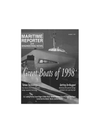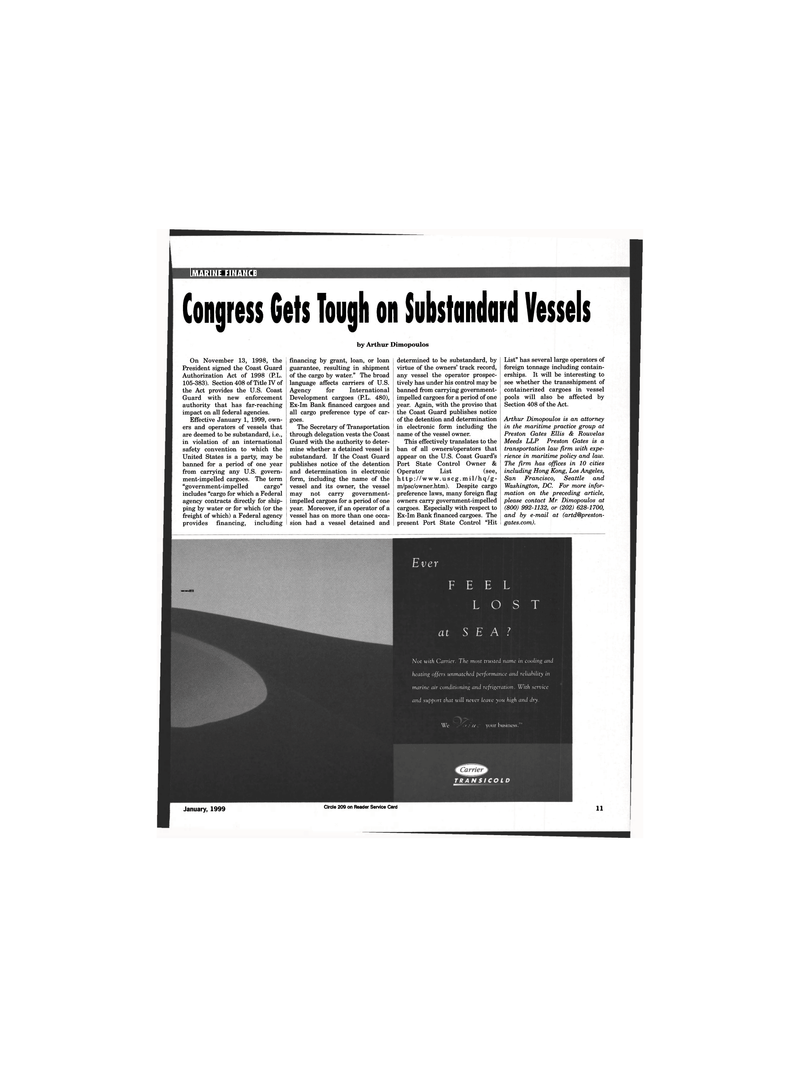
Page 11: of Maritime Reporter Magazine (January 1999)
Read this page in Pdf, Flash or Html5 edition of January 1999 Maritime Reporter Magazine
IJIMWUIIHIH:
Congress Gets Tough on Substandard Vessels by Arthur Dimopoulos
On November 13, 1998, the
President signed the Coast Guard
Authorization Act of 1998 (PL. 105-383). Section 408 of Title IV of the Act provides the U.S. Coast
Guard with new enforcement authority that has far-reaching impact on all federal agencies.
Effective January 1, 1999, own- ers and operators of vessels that are deemed to be substandard, i.e., in violation of an international safety convention to which the
United States is a party, may be banned for a period of one year from carrying any U.S. govern- ment-impelled cargoes. The term "government-impelled cargo" includes "cargo for which a Federal agency contracts directly for ship- ping by water or for which (or the freight of which) a Federal agency provides financing, including financing by grant, loan, or loan guarantee, resulting in shipment of the cargo by water." The broad language affects carriers of U.S.
Agency for International
Development cargoes (PL. 480),
Ex-Im Bank financed cargoes and all cargo preference type of car- goes.
The Secretary of Transportation through delegation vests the Coast
Guard with the authority to deter- mine whether a detained vessel is substandard. If the Coast Guard publishes notice of the detention and determination in electronic form, including the name of the vessel and its owner, the vessel may not carry government- impelled cargoes for a period of one year. Moreover, if an operator of a vessel has on more than one occa- sion had a vessel detained and determined to be substandard, by virtue of the owners' track record, any vessel the operator prospec- tively has under his control may be banned from carrying government- impelled cargoes for a period of one year. Again, with the proviso that the Coast Guard publishes notice of the detention and determination in electronic form including the name of the vessel owner.
This effectively translates to the ban of all owners/operators that appear on the U.S. Coast Guard's
Port State Control Owner &
Operator List (see, http://www.uscg.mil/hq/g- m/psc/owner.htm). Despite cargo preference laws, many foreign flag owners carry government-impelled cargoes. Especially with respect to
Ex-Im Bank financed cargoes. The present Port State Control "Hit
List" has several large operators of foreign tonnage including contain- erships. It will be interesting to see whether the transshipment of containerized cargoes in vessel pools will also be affected by
Section 408 of the Act.
Arthur Dimopoulos is an attorney in the maritime practice group at
Preston Gates Ellis & Rouvelas
Meeds LLP. Preston Gates is a transportation law firm with expe- rience in maritime policy and law.
The firm has offices in 10 cities including Hong Kong, Los Angeles,
San Francisco, Seattle and
Washington, DC. For more infor- mation on the preceding article, please contact Mr. Dimopoulos at (800) 992-1132, or (202) 628-1700, and by e-mail at (artd@preston- gates.com). • , :
Not with Carrier. The most trusted name in cooling and heating offers unmatched performance and reliability in marine air conditioning and refrigeration. With service and support that will never leave you high and dry.
We your business. "
January, 1999 Circle 209 on Reader Service Card 11

 10
10

 12
12
